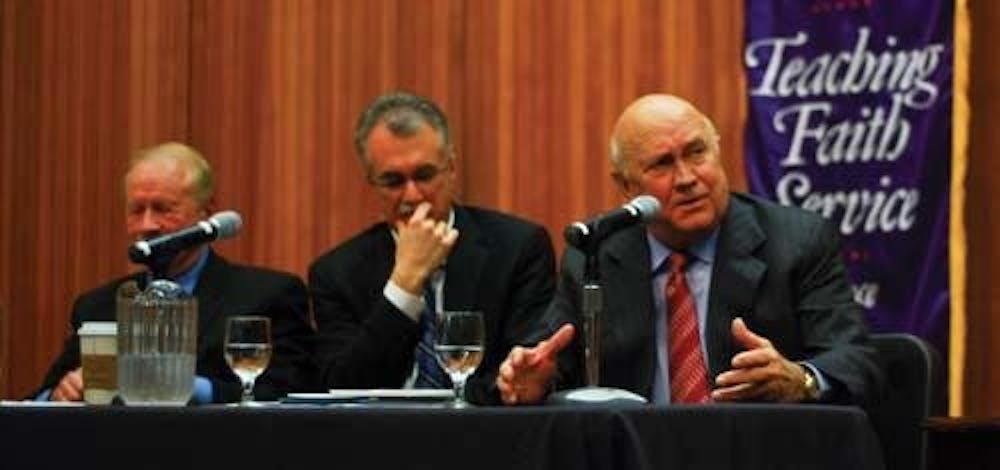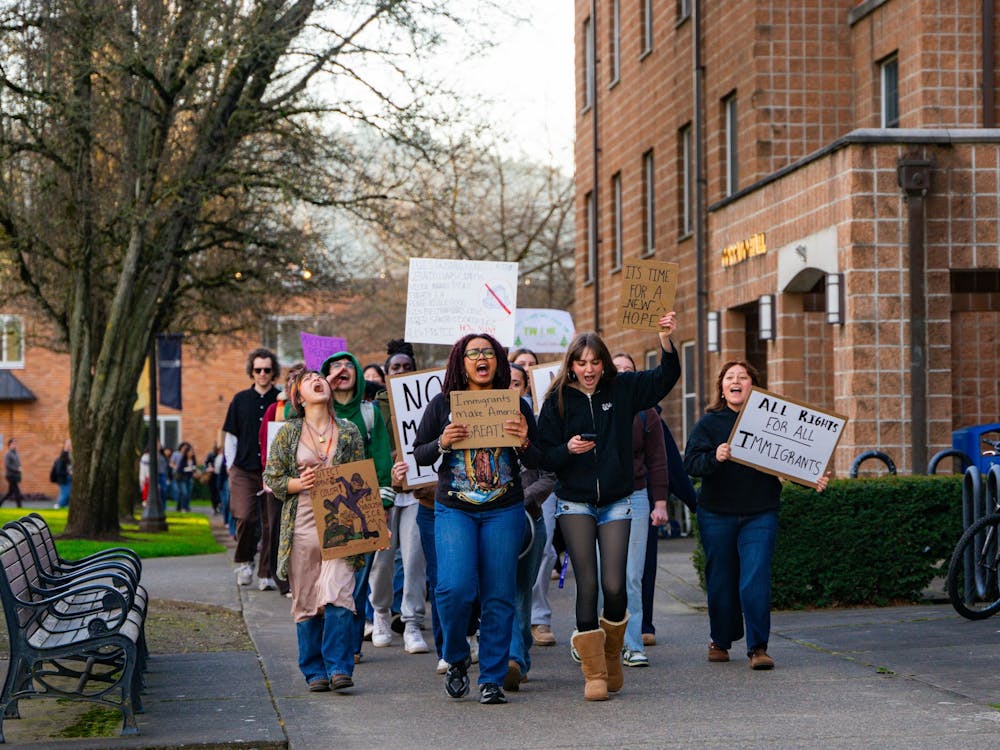No protesters were present at de Klerk’s UP appearance
(Jackie Jeffers | The Beacon)
By Natalie Wheeler, Staff Writer -- wheelern12@up.edu
Despite worries about protests during his visit to UP, former South African president and Nobel Laureate F.W. de Klerk received a warm welcome yesterday in a filled Buckley Center Auditorium.
De Klerk, who freed Nelson Mandela from prison in 1990 and helped end South Africa's apartheid, was part of a panel discussion on leadership and conflict organized by the Wholistic Peace Institute, a nonprofit organization seeking to bring Nobel laureates to Portland. While he did not address his own political career in detail, he contributed his ideas about promoting compromise among today's leaders.
"Only if you sit down and, in a calm and collected way, discuss problems can you resolve conflicts," de Klerk said. "Only if you put yourself in the other person's shoes, asking ourselves, ‘What is the other side's main concern?'"
De Klerk also said negotiation did not have to mean letting go of ideals, citing Abraham Lincoln and Martin Luther King, Jr. as examples of leaders with strong values who were able to work with those they disagreed with.
"I'm not saying that I was an excellent leader, but excellence in leadership sprouts from a person in a leadership position embracing lasting values that have been tested in time," de Klerk said.
Concerns about protests over de Klerk's participation at yesterday's panel discussion stemmed from de Klerk's controversial political career. Although de Klerk helped to end South Africa's apartheid, his government enacted numerous human rights abuses.
In spite of controversies over de Klerk's political career, Gary Spanovich, director of the Wholistic Peace Institute, shared that the Institute was fond of de Klerk as a Nobel Peace laureate.
"We believe the Nobel Peace laureates are contemporary, living Mahatma Gandhis, our greatest world peace leaders," Spanovich said. "The greatest peace minds together in a room – and you just heard one today – can lead us in the right direction for peace."
In addition to de Klerk, the panel included UP Vice President of Student Affairs Rev. Gerry Olinger, Dean of Lewis and Clark's School of Law Robert Klonoff, President of George Fox University, Robin Baker and former interim President of Willamette University Larry Large.
Fr. Claude Pomerleau, professor of political science, moderated the discussion – which highlighted the importance of negotiation among leaders in ending conflicts.
Senior Claire Hendrix, who is an intern at the Wholistic Peace Institute, thought the discussion brought out an interesting point about the need for diversity.
"I really liked how they talked about how it's really our inability to accept diversity and manage diversity effectively that leads to the issues we have today," Hendrix said.
Conversely, senior Sarah Nanbu felt the discussion on diversity, while pertinent, was hypocritical.
"I really appreciated their insights on leadership and its role in bringing about peace," Nanbu said. "But it was a little hypocritical, in my opinion, to have a panel of old white men speaking to the importance of ‘management of diversity.'"
Overall, de Klerk's appearance seemed well-received. Sophomore Katie Schultz did not know much about de Klerk before his visit, but said he seemed down to earth.
"I was expecting a politician who told us what to do, but he really was just trying to get us to be leaders in our own way," Schultz said.
(Jackie Jeffers | The Beacon)
(Jackie Jeffers | The Beacon)








